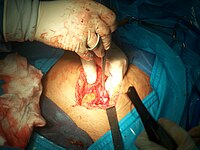
Photo from wikipedia
Purpose To investigate the impact of menstrual cycle on patients undergoing gynecological endoscopic surgery. Patients and methods 220 patients scheduled for gynecological endoscopic surgery under general anesthesia were selected. The… Click to show full abstract
Purpose To investigate the impact of menstrual cycle on patients undergoing gynecological endoscopic surgery. Patients and methods 220 patients scheduled for gynecological endoscopic surgery under general anesthesia were selected. The patients were divided into three groups based on 3 phases of menstrual cycle which are the follicular phase (Group F), ovulatory phase (Group O) or luteal phase (Group L). It is based on their duration of menstruation and the last day of menstrual bleeding from the date of surgery. Primary outcomes were the incidences of early and late postoperative nausea and vomiting (PONV) in the three patient groups. Preoperative venous blood was taken to determine the estrogen and progesterone levels of the patients. Results A total of 207 patients were enrolled. The incidence of early PONV was highest in group O (22.22% vs 43.33% vs 17.86%, P < 0.01). Multivariate logistic regression showed that menstrual cycle ( P < 0.01) and sufentanil dosage ( P < 0.05) were independent risk factors for early PONV, menstrual cycle ( P = 0.03) and intraoperative hypotension ( P = 0.03) were independent risk factors for late PONV. After the propensity matching, the incidences of early and late PONV in group O were both higher than that in other two groups (19.23% vs 44.68% vs 16.90%, P < 0.01; 53.80% vs 72.34% vs 45.07%, P = 0.01). Conclusion The incidence of PONV after gynecological endoscopic surgery was different in patients with different menstrual cycles, with the highest incidence in ovulation.
Journal Title: Journal of Anesthesia
Year Published: 2020
Link to full text (if available)
Share on Social Media: Sign Up to like & get
recommendations!